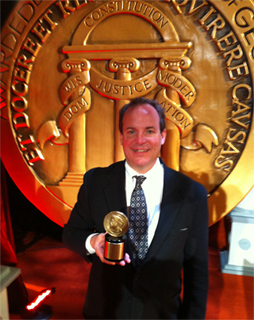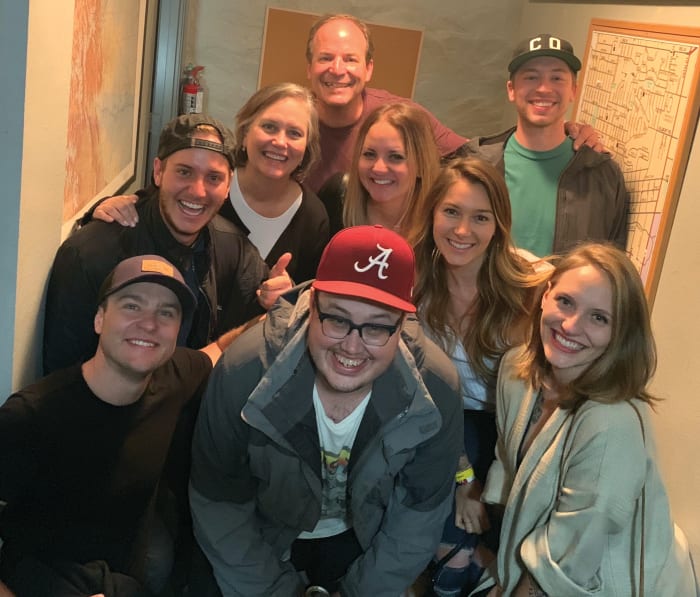Original Story posted in: RadioWorld
Date: February 11, 2019
Written by: Randy J. Stine
Consultant believes that when you stay focused on the consumer and the local market, radio works.
LAKEWOOD, Colo. — Mike Henry, founder and CEO of media research and consulting firm Paragon, has referred affectionately to radio as “the cockroach of all media.” As in: You can’t kill it.
Henry’s musings about radio are grounded in his belief in the medium’s ability to innovate and evolve. The longtime radio consultant says radio’s further development depends in part on its ability to monetize live events and new digital revenue streams.
Henry, who began his career in college radio at WUOG(FM) in Athens, Ga., in 1979, has spent 33 years analyzing client media research at Paragon. Henry’s bio is heavy with startup projects and format launches. He has played roles in the development of the NPR News brand and several music formats, including alternative and adult hits, and is closely associated with a number of Triple A radio stations. He also has been involved with numerous new media projects and companies including Live365, Sirius Satellite Radio, Sony eMarker tagging, Clip Interactive, WeedStream and public media’s VuHaus music discovery platform.
His long-held theory, first floated a decade ago, is that radio’s success depends on “hyper local content” and “multiplatform” distribution. These are themes that resonate in the age of podcasting, streaming and smartphone apps.
Radio World asked Henry, 57, about his work and the state of radio.
Radio World: You co-founded Paragon Media Strategies in 1988. Describe what it is you do.
Mike Henry: Paragon originally only did purely audience research for radio stations. Now we work pretty much with anyone who produces content for the consumer, so everything in the entertainment and media world, digital media, mobile and even satellite radio. We provide clients with audience research and do straight consulting on content, marketing and programming. We focus on all of the audience engagement aspects for clients. And we can help a company or radio station build out their website social media platforms. We have an incredible and long-term staff of researchers and consultants at Paragon.RW: What is it about radio that makes it so “resilient,” as you put it?
Henry: I think first and foremost it’s because it is still free. It’s convenient and accessible. Almost like a utility in that people know it will always be there. Secondarily, radio listening is a habit learned at a very early age and habits are hard to break.I’d like to think that radio can respond to consumer demand, even though right now I wonder if it could do better in that regard. A large part of my career has been working with radio stations and networks specifically that remain focused on the consumer and not shareholders. We focus on operators that focus on the local community and have stayed away from the major consolidated broadcast companies.
RW: You pitch your theory of delivering hyper local content along multi-platforms as a winning strategy. How is the radio industry doing as a whole on that front?
Henry: I think it is doing well. It’s probably doing better on the multi-platform distribution part of it than hyper local. I think some of the larger commercial groups struggle with reality versus their smoke and mirrors of being local. But certainly local operators and regional groups and all of public radio are very focused on local content, and I think that is why some of them have thrived during an era of consolidation when many observers figured they would be smothered by the consolidated groups.
It bears out that if you stay focused on the consumer and the local market, it works. Radio is a community asset that can organize and engage a local audience. I have seen that for 40 years in my career. That’s been the case since I started my radio career at a college radio station in Athens, Ga., in the late 1970s.
RW: Are your radio clients finding ways to monetize their digital platforms?
Henry: Oh yes. Just name a platform and there are sponsorships happening and money to be made, whether it is on websites or social media platforms. At every level a radio station touches a listener we are able to monetize that. Podcasts being the latest example. You can add in events and festivals.Sometimes it’s not immediate and not a direct turnaround of creating a new touch point and monetizing it, but over time radio has shown the ability to do that.
One space that I’m still not sure about is smart speakers. It’s not clear how radio can monetize that. That’s tricky, because right now all smart speakers are doing is raising the amount of royalties owed by a radio broadcaster but not increasing ratings because it is not measured and therefore not having a direct return on investment for that audience. That’s been elusive so far.
RW: Are you at all worried about the connected-car listening space for radio going forward?
Henry: Yes, that’s an issue, and it will be interesting to see how that plays out. The technology is still evolving. As long as a smartphone is the device controlling the content in the car, then I think radio will be in good shape. If the driver’s or rider’s personal smartphones are not accessible and are blocked by the car’s dashboard technology, then it is another story.RW: Through the years, Paragon has played a role in the launch of many music formats. How do you do that?
Mike Henry received a Peabody Award in 2012 for the public radio series “Inside the National Recording Registry” as a partner in production firm Media Mechanics.
Henry: I find the most pleasure in identifying new formats and concepts to bring people into radio. It’s a combination of research and gut feeling, I guess. When I see popular trends that are not being reflected on the radio, that’s an obvious one. You can see those trends in streaming and records sales and touring revenues for different acts. Radio needs to react to what the consumer is doing.
However, research can only get you so far. We try to read the research and respond to it but not follow the data and cross-tabs right over the cliff. Data can lie to you. There are radio format dead ends all over the place. You have to be able to read between the lines and understand the concept of external validity. Sometimes when you know the data isn’t consistent with external validity you have to go with your gut.
RW: Is there a hot new music format that excites you?
Henry: I’m working on one now that really excites me. It’s called urban alternative. It’s a public radio music format for young ethnic listeners. Think of the same music discovery concept as Triple A but in a form that concentrates on young ethnic listeners and plays hip-hop, R&B and urban, house and dance and everything else.We are working through a grant from the Corporation for Public Broadcasting and launching the format on public stations in Denver, Houston and Norfolk, Va., this year.
CPB has their passion and funding behind this because it is critical that public radio find ways to bring in young ethnic listeners. It’s critical to their continued success. We believe it will have a major impact on the radio landscape. To take the time to build and watch these new formats and audiences grow is very rewarding.
RW: If you were to place a new FM radio station on the air today in a medium market somewhere in this country, what would it sound like?
Henry: The hole in about every market in America is to play a lot of new music. The stations I work with play 50 percent to 70 percent currents and re-currents. And that stands out as being very different from the safe and predictable library-based music formats that seem to dominate most markets.Every market is a bit different, of course, but these days the opportunities seem to point to going younger with new music and become a music discovery source.
However, it’s not just the music. It takes being local, with local hosts who live the format and live in the community to serve as guides. Radio to me is a bottom-up game. You let the community help shape the product. That’s a very foreign concept to the large consolidated broadcasters.
Mike Henry and family with performer Paul Janeway of St. Paul & The Broken Bones at the Boulder Theater last fall. Bottom, from left: son-in-law Luke Askelson, Paul Janeway, daughter Rachel Askelson. Middle: son Boone Henry, wife Susan Henry, daughter Michelle Conrad, Boone’s fiancée Emily Troxler. Top: Mike Henry, son-in-law Mike Conrad.
RW: Are your clients making money off hosting live events?
Henry: Absolutely. I have clients making six figures of off single events, but you have to have a creative business model.In some cases, you own the event. In other cases you have partners in order to monetize the event. In the case of public radio, the model is member events where you sell high dollar tickets for exclusive events and access.
Really, in commercial and noncommercial radio, my clients are making money off events every year.
RW: What do the next five to 10 years hold for radio?
Henry: Additional distribution platforms and more ways to get the content out. I believe opportunities will continue to grow. And radio’s not going anywhere. Here we are in 2019 and when I was graduating from the University of Georgia’s Journalism School in 1983 they were talking about the demise of radio by 2000. Then it became 2005 and then 2010. And yet here we are.The reality is that producing local radio is not easy. It takes hard work. What is easy is building cookie-cutter brands with national personalities. What is not easy is building local brands with local content, local talent and developing local connections with the audience and business community to grow sponsorship opportunities.
With technology it’s easy to get distracted by the concept of a shiny silver bullet in the distance. However, while everyone else chases the silver bullet, smart radio operators will keep their head down and focus on the local community.
Read original story here.



Leave A Comment